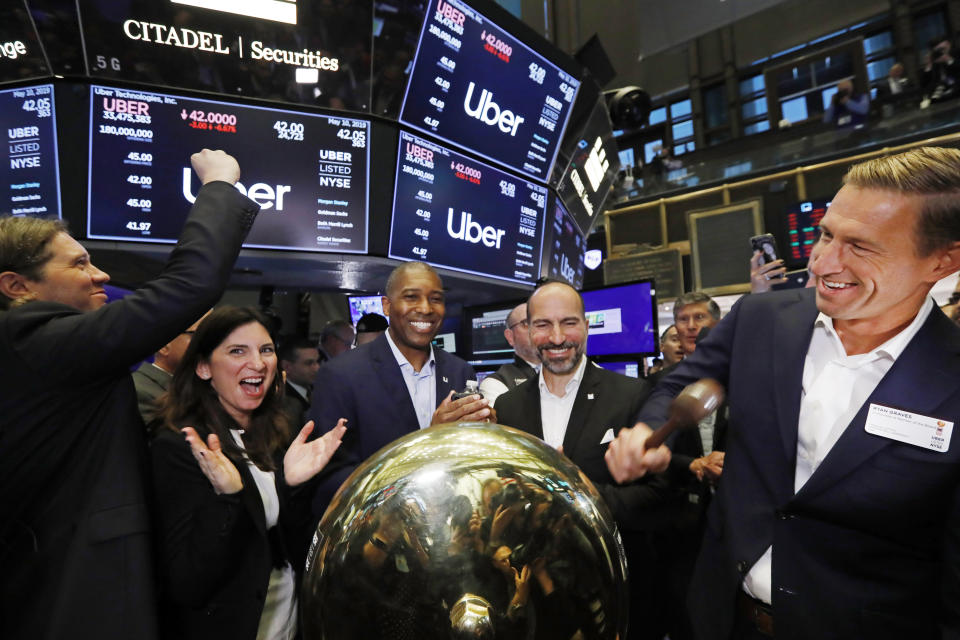Taskrabbit founder on Uber, Lyft: 'Sometimes you have to trade growth for profitability'
Taskrabbit had raised $50 million in funding and was profitable when IKEA acquired the online marketplace for handymen-on-demand in 2017. While there has been a deluge of initial public offerings in 2019, there has been a drought in profitability from some big companies that are going public, namely household names like Uber (UBER) and Lyft (LYFT) and even Fiverr (FVRR), a marketplace for freelance services.
Before the money-losing ride-hailing giants became household names, Taskrabbit was the pioneer of the gig economy — where workers forgo salaried jobs and instead work as freelancers or contractors.
In a new interview with Yahoo Finance, Taskrabbit founder Leah Busque Solivan said she has wondered about other exit strategies her own gig economy startup could have taken. After all, becoming an independent public company is considered the ultimate milestone for successful entrepreneurs.

“It's interesting, I sort of have a mixed view on that. I think the way that I operated and built over the years...we always operated to profitability. So before we sold to IKEA, we were profitable. And that's a very different way of operating a business than what we see happening with the IPO markets today,” she said.
“And so it's just a choice. I think, as an entrepreneur, and as a CEO, sometimes you have to trade growth for profitability. And it just really depends, I think, on the market and your customers. And how well you think you can do in the long-term,” she told Yahoo Finance.
‘That idea seemed insane ... and so did Taskrabbit’
In her interview with Yahoo Finance, Solivan noted that when she founded Taskrabbit in 2008, jumping into a stranger’s car was not the norm.
“That idea seemed insane at the time. And so did Taskrabbit,” she said. “So we were really one of the first to start driving this peer-to-peer economy and really build trust between strangers to get help and get things done.”
The value of the acquisition has never been disclosed, but it’s a successful exit by most measures (though some data from six months ago suggests consumers might be down on Taskrabbit). It was a seemingly natural fit, a build-it-yourself furniture company now allowing consumers the option to give DIY some support as needed.
Solivan, who served as the company’s first CEO, moved into the role of executive chairwoman and spearheaded the talks with IKEA, which went on for 9 months before resulting in a deal. Former COO Stacy Brown-Philpot had moved into the chief executive role, leading day-to-day operations, so Busque was able to act as negotiator in chief.
Now a general partner at VC firm Fuel Capital, Solivan has deeper insights into the investing process — but this time, on the other side of the table. Fuel recently raised $75 million for its third fund.
“The team really matters... Is this a team that can you know, forego profits in the short term? But do I believe that in the long term, they're going to be able to pull it together? Because at some point, right, that has to happen. And so it really just depends on the space in the team. I come from an engineering background, very analytical, very focused on unit economics and profits. So I tend to sort of gear in that direction. And that's how I operate in my business,” she said.
Solivan says her tech and engineering experience is “incredibly complementary” to Fuel founder Chris Howard. He comes from a marketing and advertising background, and raised the first two funds on his own.
“The two of us together can really help our companies grow and flourish. We've also taken a strong focus on branding, marketing and go-to-market at the earliest stages. That’s something that really helped us develop and grow and scale at Taskrabbit — just being able to tell our story and get it out there.”
Melody Hahm is a senior writer at Yahoo Finance, covering entrepreneurship, technology and real estate. Follow her on Twitter @melodyhahm. She hosts Breakouts, a monthly interview series for Yahoo Finance featuring up-close and intimate conversations with today’s most innovative business leaders.
Read more from Melody:
The future of fashion: How the RealReal and Revolve are reinventing retail
Bombas CEO: We could easily be a billion-dollar brand in the next 5 years
Preet Bharara: College admissions scandal is 'not that different from insider trading'
Two couples turned an axe-throwing hobby into a million-dollar business
How a single dad turned weed tours into a $1.8 million business
3 Dreamers describe how DACA helped them find careers in America